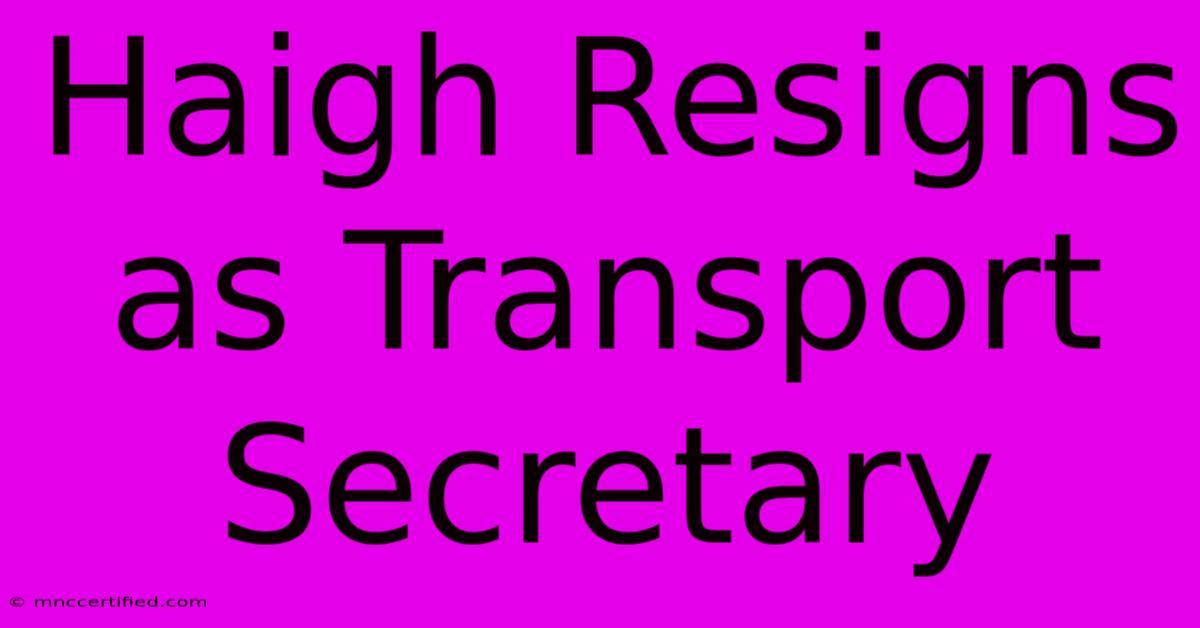Haigh Resigns As Transport Secretary

Table of Contents
Haigh Resigns as Transport Secretary: A Shock to the System?
Grant Shapps' resignation as Transport Secretary sent shockwaves through British politics. While resignations are common in the fast-paced world of government, the circumstances surrounding Shapps' departure and its potential impact on ongoing transport initiatives warrant closer examination. This article delves into the reasons behind his resignation, the potential consequences, and what the future holds for the UK's transport sector.
The Reasons Behind the Resignation
While the official statement cited "personal reasons," speculation surrounding Shapps' departure is rife. News outlets have highlighted various potential contributing factors, including:
-
Pressure from ongoing investigations: Reports suggest that Shapps faced scrutiny regarding allegations of misleading Parliament. These investigations, though not definitively linked to his resignation, undoubtedly added pressure to his position. The lack of transparency around the precise nature of these investigations fuels public speculation and further intensifies the political fallout.
-
Cabinet reshuffle anticipation: With Prime Minister Rishi Sunak facing ongoing challenges, a cabinet reshuffle had been anticipated for some time. Shapps' resignation could be a preemptive move, potentially allowing him to leave on his own terms rather than be forced out. This strategic move, if intentional, underscores the political maneuvering inherent in high-level government roles.
-
Personal Circumstances: While "personal reasons" are often cited in such situations, the vagueness surrounding the specific reasons leaves room for interpretation and fuels ongoing media speculation. The public deserves clarity, and the lack thereof only adds to the intrigue surrounding this sudden resignation.
Analyzing the Impact on Current Transport Projects
Shapps' departure leaves several significant transport projects in a state of uncertainty. Key initiatives like the HS2 high-speed rail line, the ongoing upgrades to the national rail network, and the government's broader decarbonization strategies for transport are all potentially affected. The appointment of a new Transport Secretary will require a period of transition, potentially causing delays or adjustments to these crucial projects.
The importance of stability in transport planning cannot be overstated. Disruptions caused by leadership changes can lead to project delays, cost overruns, and overall inefficiency. The government must act swiftly and decisively to appoint a replacement who can ensure continuity and maintain momentum on these vital projects.
Who's Next? Speculation and Predictions
The race to replace Shapps is already underway. Several potential candidates are being discussed within political circles. The next appointee will inherit a challenging portfolio, requiring a deep understanding of transport policy, strong leadership qualities, and the ability to navigate complex political landscapes.
Key Qualities of the Next Transport Secretary
The next Transport Secretary will need:
- Strong political acumen: The role demands navigating the complexities of Westminster politics and effectively collaborating with various stakeholders.
- Expertise in transport policy: A deep understanding of the UK's transport infrastructure and policy challenges is essential.
- Effective communication skills: The ability to clearly communicate plans and progress to the public is paramount.
Conclusion: Uncertainty and the Road Ahead
Grant Shapps' resignation as Transport Secretary marks a significant moment in UK politics. While the exact reasons remain unclear, the impact on ongoing transport projects and the stability of the sector is undeniable. The government's swift and strategic appointment of a new Transport Secretary will be critical in minimizing disruption and ensuring the continued progress of essential infrastructure projects. The coming weeks will be crucial in observing how the government manages this transition and addresses the lingering questions surrounding Shapps' sudden departure. The public deserves transparency and accountability, and close scrutiny of the process is essential.

Thank you for visiting our website wich cover about Haigh Resigns As Transport Secretary. We hope the information provided has been useful to you. Feel free to contact us if you have any questions or need further assistance. See you next time and dont miss to bookmark.
Featured Posts
-
Sheffield United Sunderland Live Score
Nov 30, 2024
-
Black Friday Deals Expiring
Nov 30, 2024
-
College Football Rivalry Week Scenarios
Nov 30, 2024
-
The James Bond Archives Book
Nov 30, 2024
-
Homebase Stores M And S And Kingfisher Interest
Nov 30, 2024